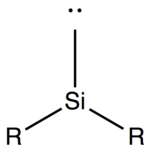
Silylene

Silylenes are chemical compounds containing a divalent silicon atom without any electrical charge. Both dicoordinate and tricoordinate silylenes are reported in the literature. They are considered to be heavier analogues of carbene. In earlier times, they were called silene, but this is a mistake, as that term means compounds of π-bonded silicon: Si=C. The generic term analogous to carbene is 'silicene.' Silylenes are chemical compounds containing a divalent silicon atom without any electrical charge. Both dicoordinate and tricoordinate silylenes are reported in the literature. They are considered to be heavier analogues of carbene. In earlier times, they were called silene, but this is a mistake, as that term means compounds of π-bonded silicon: Si=C. The generic term analogous to carbene is 'silicene.' Silylenes have been proposed as reactive intermediates and are so unstable that they usually cannot be isolated. While carbenes are observed in either the triplet or singlet state depending on the nature of the substituents, silylenes typically have a singlet ground state because the energy gap between the 3s and 3p orbitals of the silicon atom is very large and so the singlet-triplet gaps are enormous.
